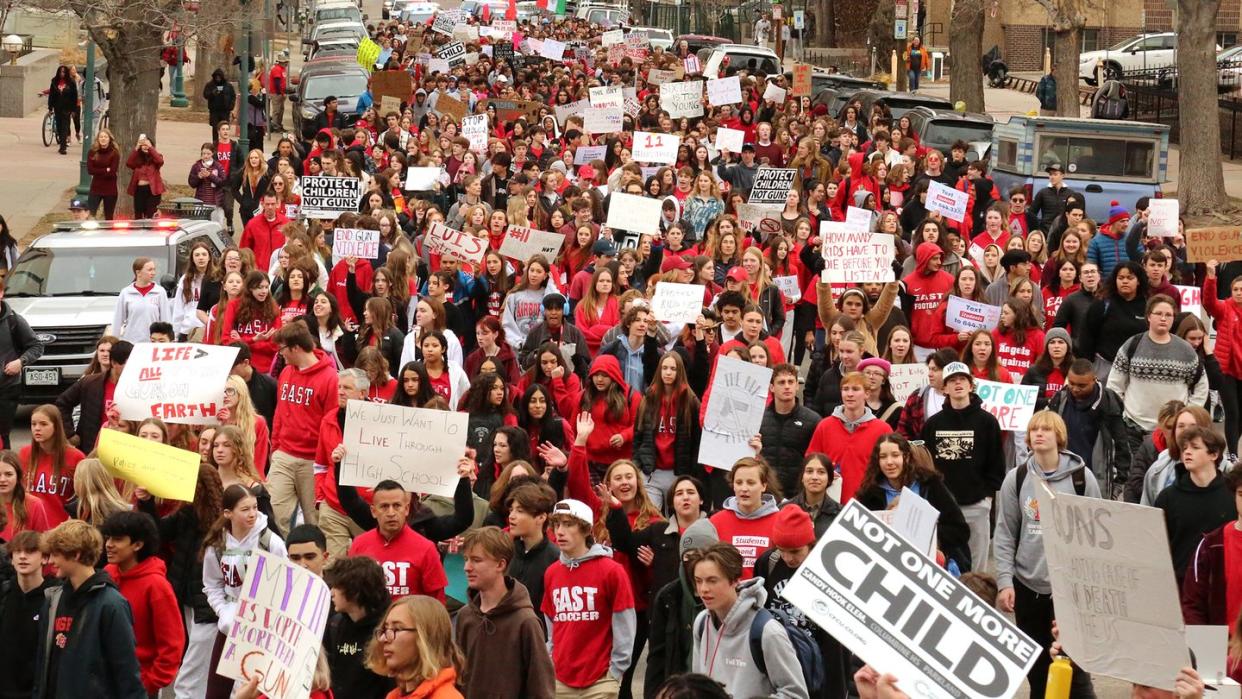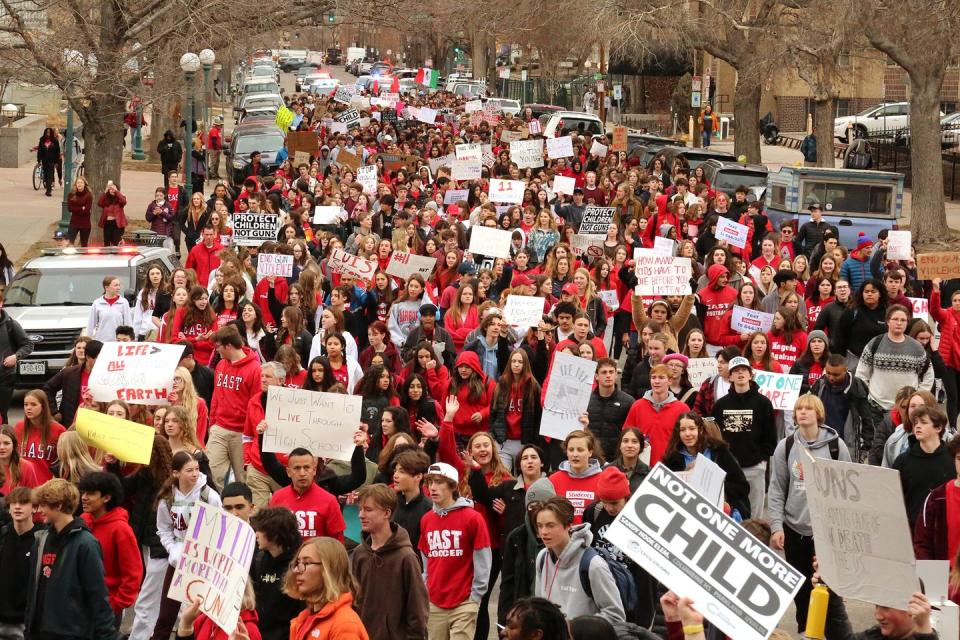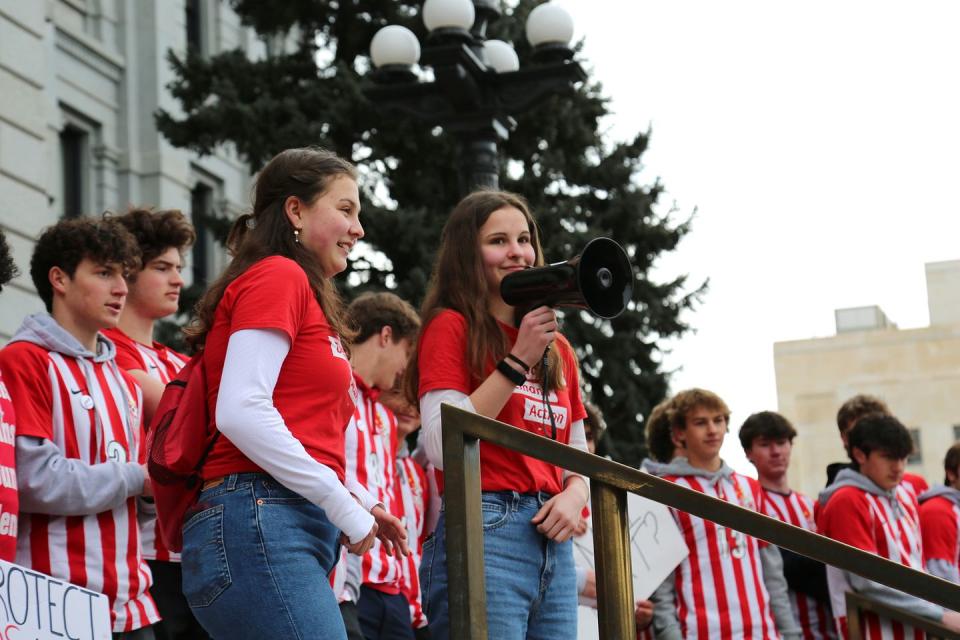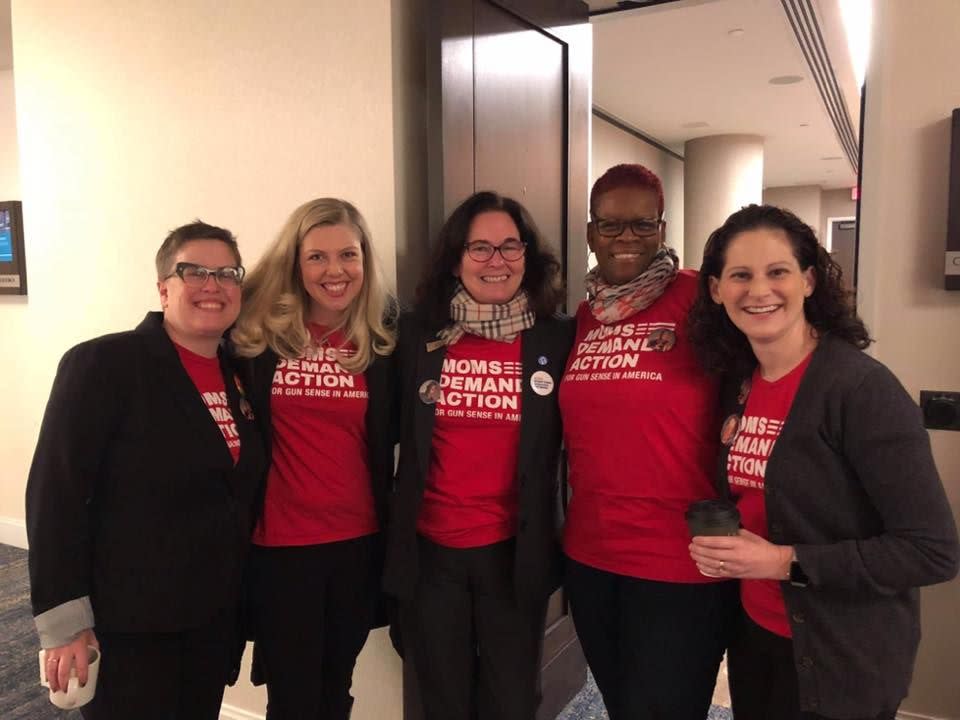‘It Should Have Stopped With Us’: A Columbine Survivor Speaks With a High School Activist


Saturday marks the 25th anniversary of the Columbine High School massacre, in which 12 students and one teacher died. Though it was not the first mass shooting at a school, it marked the symbolic beginning of an era in America where students are forced to consider their safety from guns every time they step inside a classroom.
Salli Garrigan was a 16-year-old junior when the Columbine shooting happened in 1999. For years, she considered herself lucky just to have escaped—but the nationwide call-to-action following the 2018 shooting at Marjory Stoneman Douglas High School helped her realize that she had something significant to offer. She’s now a Senior Fellow with the
Everytown Survivor Network, a program of Everytown for Gun Safety, the country’s largest gun violence prevention organization, and a volunteer with Moms Demand Action, a grassroots network of Everytown which started immediately after the Sandy Hook school shooting. While she didn’t grow up doing in the age of lockdown drills, her two children, ages 9 and 5, will.
Since Columbine, the looming threat of a school shooting has haunted students and teachers; There have been at least 16 school shootings in America so far this year, resulting in the death of nine people. Clara Taub, 16, lost her classmate Luis Garcia, who was shot outside East High School in Denver in 2023. As a high school freshmen, Clara and her twin sister, Gracie, formed a chapter of Students Demand Action, a national movement of young gun reform activists founded in the wake of the Marjory Stoneman Douglas High School shooting. In 2023, they led a march to the Colorado Capitol to ask legislators how they plan to help students stay safe.
On the week of the Columbine anniversary, Salli and Clara spoke to each other about working as activists, the difference in how each of their generations has experienced gun violence, and their hopes for a safer future.
How did each of you become active on the issue of gun control?
Clara: I grew up in a very active family, not specifically with gun violence, but with a lot of other issues. I grew up hearing about the news and listening to NPR. I was specifically engaged from a pretty young age. In terms of gun violence, I became active my freshman year of high school. My school is 2,500 people. My sister and I wanted to join a club. We were looking through the club list, and then we realized that there wasn’t a Students Demand Action Club. We were very scared freshmen, so we were like, ‘We’ll just wait for someone to start it or we’ll tell someone to start it.’ Our mom was like, ‘You got to start it. It’s got to be you.’ We’re like, ‘Absolutely not. Freshmen don’t start clubs.’ But we started it the February of our freshman year. We’ve been going ever since.
Salli: For me, it’s a different story. I actually was not active for 20 years after the Columbine shooting, because I had different outlets. I didn’t really feel like I had much to give to the conversation. It wasn’t until the Parkland shooting happened—and it was so eerily similar to the Columbine shooting and my own experience—that I knew I needed to get involved. I was inspired and motivated. While the survivors were telling their stories, I realized, ‘Oh my gosh, that is almost my story, also.’ It also made me realize that I, too, am a survivor. For the longest time, [since] I wasn’t physically injured, I never saw myself as a survivor until the Parkland shooting.
Salli, are there things about your experiences that you think could help people of Clara’s generation?
Salli: I always feel sorry. I always feel like I need to just say, ‘I’m so sorry.’ I personally stood on the sidelines for so long, when I could have been a voice. It should have stopped with us. But then I always have to remember that it was so new and fresh and we didn’t have experts. Nobody knew what to do. It became so glorified on the news [that] I think it became more of an obsession. That’s when fear rose.
I think instead of finding the cause, it created a weird culture. People took advantage of that culture and the gun industry was never held accountable. I think because of that we wanted to get out of the news. When we would try to heal, we were being photographed, we were under a microscope. A lot of us just wanted to sidestep and not be a part of it at all. I’m just so thankful for the students now, because they’re ready to fight. You can’t be on the sidelines anymore.
Clara: That was great what you said, especially about the feeling that it was your fault. As someone this young, looking at survivors who are older than us, it’s more that it’s incredible that it’s gone on for this long. It’s not that no one has done anything about it, it’s the stubbornness of the gun industry.

Clara, do you seek out the experience of activists who’ve been doing it for years? Can they help you or give you advice?
Clara: I really didn’t know how to be an activist. That’s not something they teach you in school at all, advocating for rights. It’s a different level of speaking up for yourself, which we learn in the context of asking your teacher questions. It was really helpful to [interact with] older activists who have been doing this longer, especially testifying at the Capitol. Moms Demand Action, and all of the moms there, they’ve been doing this for years. Their kids grew up doing lockdowns and were survivors, some of them. Seeing that in action really inspires me, and that’s also helpful as a guideline for what we should be doing.
Do you feel like any progress has been made?
Salli: Absolutely. There has been. What gives me hope is all this progress. It’s just like I said, we didn’t have anybody to turn to. We didn’t have anything like this after the Columbine shooting. There’s this whole grassroots gun violence prevention army now ready to make change, and there’s a vast amount of people, all across the country, ready to keep fighting.
There was the Bipartisan Safer Communities Act created in 2022. That’s huge, something where people actually came together to make change. I do see hope, which I didn’t for so long, because I just felt lost and felt like there was nothing to give. Now I feel like we’ve just got to keep fighting, because we’re chipping away and chipping away. I do. I feel very hopeful.
Clara: I would say the same thing. We’ve made so much progress, especially in the last 10 years, and especially in Colorado. Just last year, we passed six major gun prevention laws, laws that we didn’t have before. We’re making progress every year. It’s interesting that the way gun violence spreads, more people are affected every year. It creates this opposite force that is constantly fighting, growing against this violence and a big portion of that population is students. I think with the numbers [of people standing up] and the legislation we’ve passed and the awareness of gun violence that has gained in America, that’s progress in and of itself.
Have you had the experience of talking with someone who opposes gun restrictions or some of the other things you feel are necessary? How do those conversations go?
Clara: There’s many stories. We get a little bit of a toned down version as students, [but] definitely not to the extent that you would think. At our state Capitol, there will be victims of school shootings, and then sitting right next to them is someone from Eagle, Colorado, that owns guns and hunts with the guns.
Those conversations, a lot of the time, can be really frustrating, but weirdly are very empowering, especially advocating and doing this with other students. We’ve knocked on senators’ doors and they get slammed in our faces, but the reaction is not, ‘Oh man, that sucks.’ It’s like, in four years I’ll be able to run and I’ll take their seat, and that’s going to be different. It’s frustrating, but it is not a dead end. I think there’s movement happening.
Salli: I do come from a family of hunters. I grew up in Colorado, so I do understand gun ownership. It’s been good for me to have conversations with gun owners. I do not own guns myself, but it’s been great for me to [hear from them.] I learned a term ‘gettable middle.’ I love having conversations with people to figure out what do we have in common. For the most part, safe storage is something we all do believe in. I feel like that’s where, together, we can really make sure that people do lock up their guns. Now that I have kids of my own, if they go out on play dates, I want to make sure that guns are locked up. We do know that about 75 percent of school shootings carried out by a shooter under 18 were because a gun was left out at home. This, to me, is very important. We need to have these conversations together. So, like I said, [work on] the gettable middle instead of debating. It’s been really helpful to have these moments to work together.
In terms of advocacy, is there a benefit that comes with people from different generations working together?
Clara: One hundred percent. It’s the different experiences. I grew up with this in mind all the time. I grew up doing lockdowns and hearing this on the news. But for a lot of the people that are advocating for this, they saw a switch. They didn’t grow up doing lockdowns or hearing about this. They saw Columbine happen and then they were outraged, and then it just kept happening. So, I think there’s different levels. I grew up with this as the norm, and other people didn’t. That perspective is really important when fighting for the country that we want, because it has [existed]. I think that perspective [reminds us that] it’s possible to go back.
Salli: You talk about age and it’s been so interesting to now talk to Clara who’s the same age as I was when the Columbine shooting occurred. It’s been amazing to see how brilliant these new generations are with this topic. I have a lot of hope with the future generations. I do thank Clara, and students like Clara.
The anniversary of Columbine is coming up. Clara, I’m sure there are dates that are personal to you. What do these anniversaries feel like?
Clara: Anniversaries are important for healing; stepping back from advocacy and really just taking a moment to remember why we’re doing this. Gun violence is always a political issue, but the deaths and the people are not political. That part isn’t political. Remembering why we bother to fight in the first place is important.
Salli: For us, each anniversary brings on something, but it is truly a day of reflection. It’s a way for all of us, 25 years later, to reconnect and see what’s been going on. I like to make it a year point. What have I done to help out? What have I talked about? Has there been change made? It’s a day of reflection. It’s interesting, this year it surprised me that it has been 25 years. That’s a hard thing to imagine, that we’re still having this conversation. I’m hoping someday you don’t want to talk to me. That’s where I want to be.
What do you think the media could do better in terms of covering gun violence and school issues?
Salli: Do not talk about the shooters. Do not. Don’t say anything. Talk more about what can be done to change this, more advocacy, and how we can stay safe. Make it more about the gettable middle, talk about safe storage.
Clara: At my school, we got a lot of media attention. We’re in the city and one of the bigger schools in Denver, but similar things, almost the same things, were happening at other schools in the city and they weren’t getting coverage. It spoke a lot to almost the privilege that we have to get this media attention, because it built this movement at our school that really helped with a lot of the change.

What do you hope you can bring from these horrible experiences to help other people?
Salli: It becomes such a numbers game now, percentages and body counts. It’s so ridiculous. We need to humanize this again. That’s where I do feel survivor stories are important, because these are human lives. It affects a whole community. I want it to be humanized again.
Clara: We tell people in our club, when we testify and when we go to the capitol and when we do this advocacy, to tell their stories of how gun violence has affected them personally. For a lot of them, that’s what happened at our school last year, but for some of them, it’s what happens at home and what happens in their neighborhood. Those stories are important. The humanization of it is really important.
Clara, what’s the interest in your club? Is this something a lot of students want to be a part of?
Clara: It’s good and bad, the amount of members we have. For good, a lot of people are involved in our club. Last year, basically our whole school walked out to go to the Capitol. But the size of it also represents how many people this is affecting, which is not good. The more change we can get done, the less people it affects. I think that I would love to have a tiny club where it’s three people, but it’s not that. It’s 50 people and our whole school’s involved now.
Salli, do you have friends or classmates that you talk to about this work?
Salli: We do still have that connection that we were in the room together or we ran out together. No matter what we believe in now, it is a great way to connect. I have those close, close friends that check in and just [ask] how are you doing this year? It’s probably one of the most important things to have these friendships 25 years later.
Who would you love to have an audience with or be able to speak to about this?
Salli: I have loved just talking to Clara. I love talking to the younger generations—and not talking to, but talking with. It’s been so helpful to hear their insight. It’s brilliant. I did not experience this growing up. Their whole generation is so different, and it’s what my kids are going to go through, too. For me, it would be a room of students to educate me.
Clara: A conversation with someone that I disagree with. There’s a few senators and representatives in our state Capitol that would probably be put on this list. Just sitting down with them and [seeing,] actually what do we agree on? Because I know we don’t disagree on everything. It’s interesting because gun violence often gets tied in with a lot of other issues. We’ve had fights while testifying about abortion and school education and all these things. But what do we actually agree on and what could help? It’s such a holistic issue and I don’t think [gun control opponents] would be against after school programs or more education. Because I also am not here to ban all guns. I don’t want that. I don’t think that that’s an attainable thing to do. Just sitting down with someone that I disagree with and having a civil conversation would be really interesting and really helpful.
Salli: Clara, how is it for you now that you’ve actually been through something at your school?
Clara: I did grow up doing lockdown drills, and I don’t remember feeling overly scared. It was like a fire drill. You just did it, [and] you’re done, but that definitely changed in high school.
Last year [there] was a swatting incident. It wasn’t actually a shooting, but I do remember in that moment being like, ‘It’s real. It’s happening.’ We had our phones and people were looking on Snapchat, and there were like 60 police cars outside. I remember holding a pencil and thinking, ‘They’re going to come in here, and they’re going to sweep the room,’ which they ended up doing with sniper guns. I thought ‘They’re going to look at my pencil and they’re going to shoot me.’ I distinctly remember putting down my pencil, and then I don’t remember anything else until I got outside and called my dad. I just immediately started crying. You don’t think about those things until you’re actually in it. After that I took lockdown drills a lot more seriously. There was a lot more weight to them.
I get stressed out about alarms and fire trucks and ambulance sirens and all those things, which is something that I think is pretty common with people in my generation, because we’ve just had to experience it so much. I think when it actually does happen, it’s very different from the drill. It’s always a balance of is it safe or is it not safe to go to school? Sometimes the balance is off. Sometimes it’s not safe to go to school.
You Might Also Like

